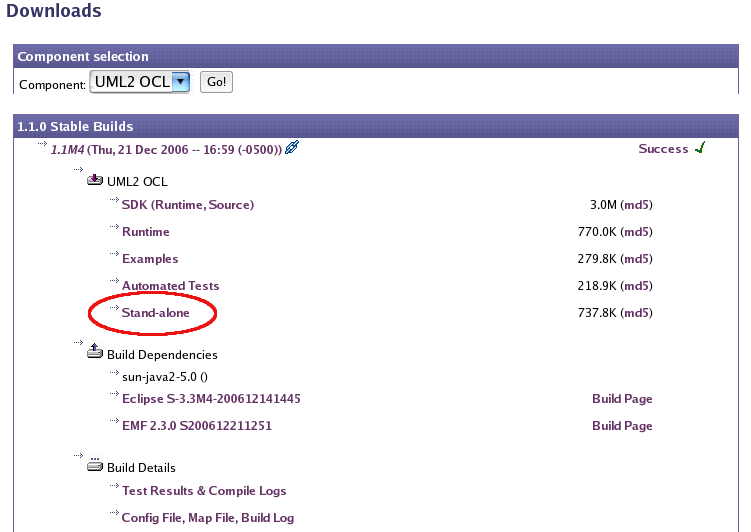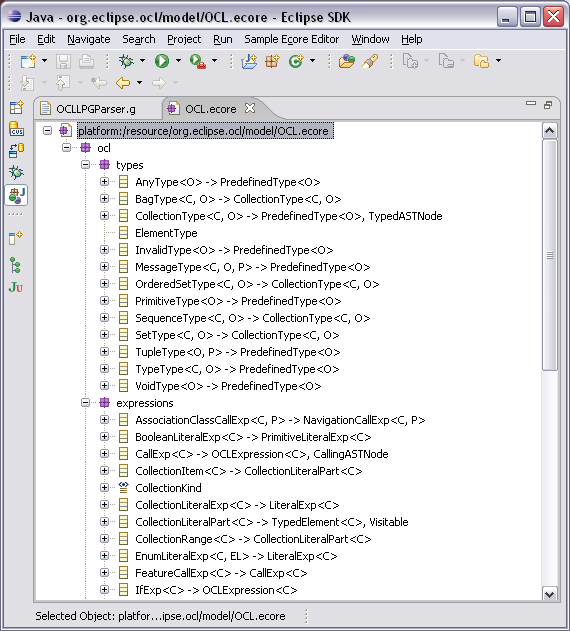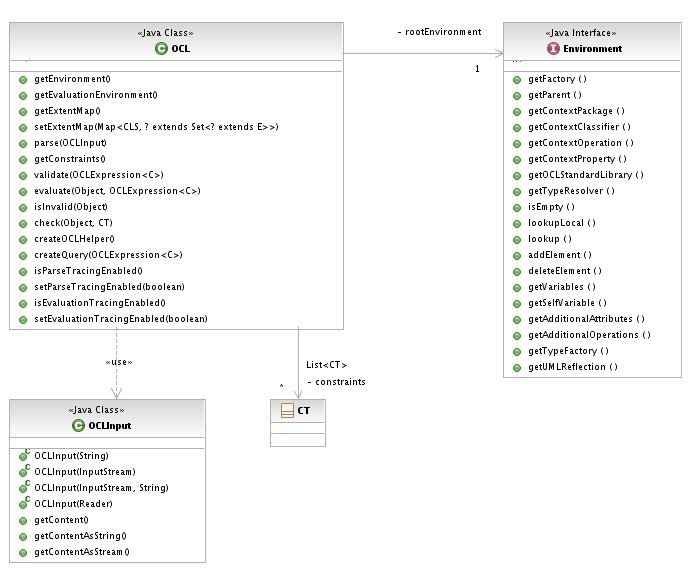Notice: this Wiki will be going read only early in 2024 and edits will no longer be possible. Please see: https://gitlab.eclipse.org/eclipsefdn/helpdesk/-/wikis/Wiki-shutdown-plan for the plan.
MDT/New and Noteworthy/1.0
Model Development Tools Release 1.0 New and Noteworthy Items.
For more details about the development plan, see the MDT 1.0 draft plan.
Back to Modeling Development Tools.
Contents
EMF Ontology Definition Metamodel (EODM) Component
Object Constraint Language (OCL) Component
Release 1.1 M4
LPG Java Runtime Restructuring
In the OCL 1.0 release, the SourceForge LPG Java Runtime library was embedded in the OCL bundle JAR. It has now been contributed to Orbit as a distinct bundle net.sourceforge.lpg.lpgjavaruntime.
Stand-alone Deployment Support
The OCL Downloads page now includes a stand-alone ZIP containing just the JARs required for deployment in a non-Eclipse environment. The EMF stand-alone deployment that is also required is available separately.
Other Bug Fixes
For other bug fixes, see the 1.1 M4 release notes.
Release 1.1 M5
EMF 2.3 Adoption and Generics
This milestone introduces a significant refactoring of the OCL Parser/Interpreter API, with the adoption of EMF 2.3 and its support for generic types. Using Ecore's generics, a new generic Abstract Syntax model for OCL is defined in the org.eclipse.ocl plug-in:
This new model, and the OCL Parser/Interpreter core API, are thus freed from the dependency on the Ecore metamodel. The org.eclipse.emf.ocl plug-in is now deprecated and is supplanted by an Ecore binding (and environment implementation) of the generic model in the org.eclipse.ocl.ecore plug-in. The deprecated API delegates to the new Ecore binding for parsing of constraints, translating the resulting ASTs to the old Ecore-centric model. Utilities are also provided to convert existing ASTs in the old model to the new. The org.eclipse.emf.ocl API remains fully supported.
OCL Document Parsing API
The new org.eclipse.ocl.OCL generic class is the focal point
of OCL parsing and evaluation. Besides creating org.eclipse.ocl.helper.OCLHelpers
for parsing embedded constraints and org.eclipse.ocl.Querys
for evaluating constraints, it can also parse OCL documents (text files external to the model). The
content of an OCL document is encapsulated by the org.eclipse.ocl.OCLInput class:
The parser supports the package and classifier context declarations, as well as all of the
kinds of constraints supported by the OCLHelper for
embedded constraints:
- classifier invariants
- operation pre-, post-, and body conditions
- attribute initial and derived values
- def: expressions for additional attributes and properties
For example:
package ocltest
context Fruit
inv not_black: self.color <> Color::black
def property_helper:
otherFruits : Set(Fruit) = Fruit.allInstances()->excluding(self)
def operation_helper:
getOtherFruits1(fruit : Fruit) : Set(Fruit) = Fruit.allInstances()->excluding(fruit)
context Apple::preferredLabel(text : String) : String
pre text_not_null: not text.oclIsUndefined()
pre text_not_label: text <> label
body compute_label: result = if text = label then '' else text endif
post label_is_changed: label <> label@pre
post label_is_set: label = text
context Apple::name : String
init: ''
derive: if label.oclIsUndefined() then '' else label endif
endpackage
OCL Constraints on UML Models
The new generic OCL implementation lays the ground-work for support for the UML metamodel (as opposed to Ecore). This is implemented in the new org.eclipse.ocl.uml feature (and plug-in of the same name). This consists of
- UML bindings for the generic parameters of the core OCL API, including a UML implementation of the
Environment - a specialization of the OCL Types package for OCL metatypes that are consistent with UML
- UML models of the abstract syntax model, UML binding, and OCL Standard Library (works in progress)
The UML environment supports the following UML-specific OCL concepts that the Ecore environment does not:
- isQuery property of operations
- qualified association navigation
- association-class navigation
- state expressions (using UML state machines)
- constraints defined on stereotypes
The UML evaluation environment (for evaluation of OCL constraints) supports two kinds of instance models:
instance specifications in the UML model (as InstanceSpecification elements)
and run-time instances (as EObjects) of an API generated by the UML2
code generator. Evaluation on instance specifications supports association-class and qualified association
navigation but not operation calls (except where those operations have body conditions specified in OCL).
As a special case of the evaluation on EObjects, for the UML metamodel itself, the UML
environment allows constraints defined on stereotypes to be evaluated on
Elements to which they are applied, as well as on the stereotype instances.
In either case, the constraint must be expressed in the context of the stereotype, navigating
the appropriate metaclass extension(s) to access the base element.
Other Bug Fixes
For other bug fixes, see the 1.1 M5 release notes.
In particular, attitional operations and attributes defined by def: expressions (parsed from OCL documents or via the helper) are no longer "global" (attached to the model context classifier). They are now local to the org.eclipse.ocl.OCL environment in which they were parsed.



